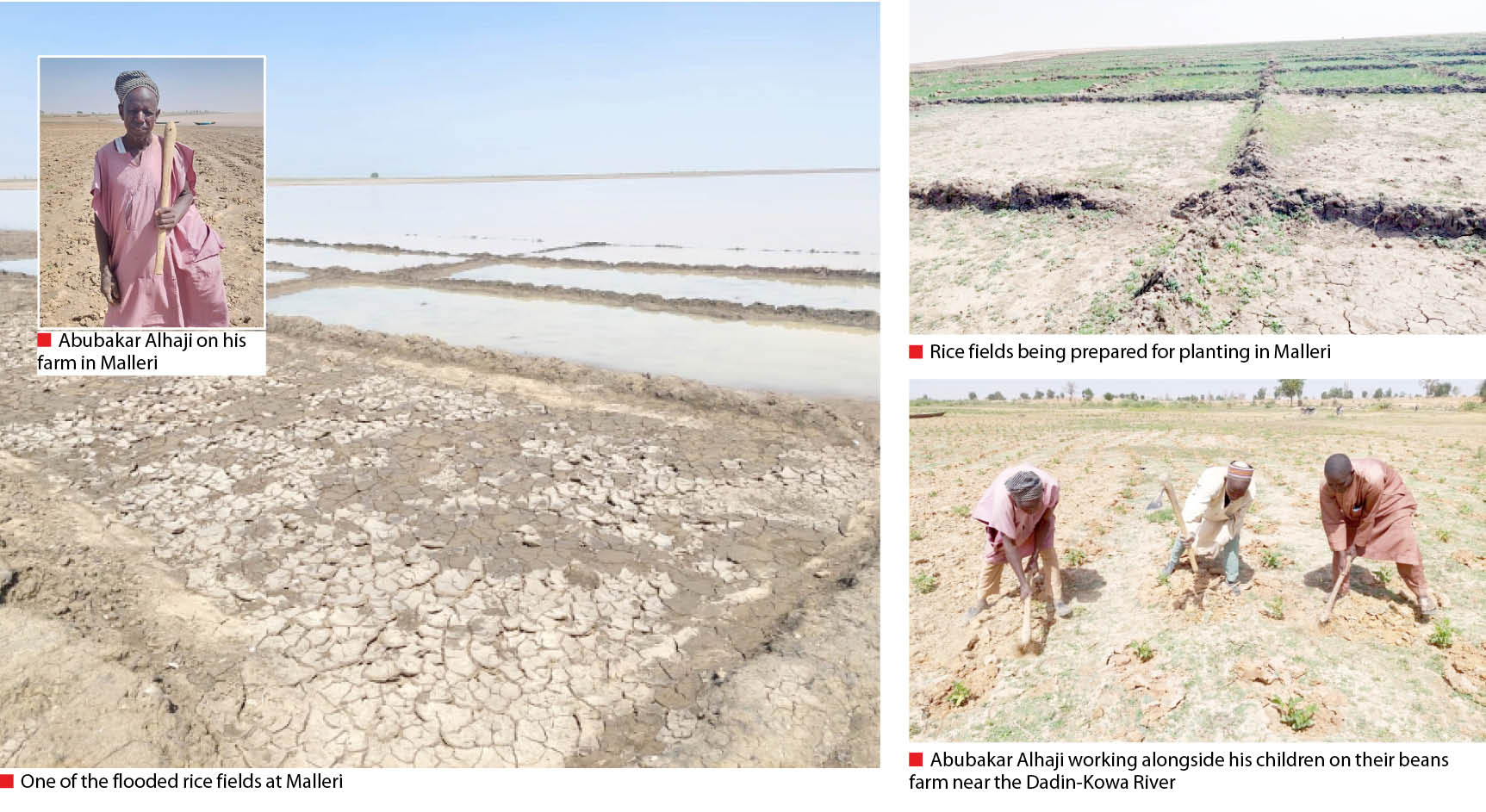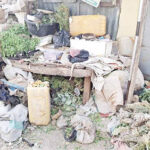Malleri in Kwami LGA of Gombe State is an agrarian community located about 60 kilometres in the North Eastern part of Gombe town.
Our correspondent who visited the community reports the concerns of residents over incessant hippopotamus attacks on their farmlands.
A 60-year-old farmer, Abubakar Alhaji, alongside his children, was clearing his farm on the banks of the Dadin-Kowa River for dry season farming, hoping to recover the losses he recorded during the rainy season following floods that ravaged his farms.
He explained that as he was recovering from the flood losses, a bloat of hippos invaded his farms and destroyed the remnants of crops and other plantations that survived the floods.
- Tackling menace of thuggery among youths
- Katsina gov’ship: Chances, weaknesses of APC, PDP, LP, NNPP candidates
He said, “We used to experience flooding occasionally on our farms, but last year’s was the worst. I suffered great losses on my five farms where I planted rice and sorghum from flooding and hippos.
“Hippos usually ravage our farms. The government has banned us from killing them. We see them destroying our crops but the government has warned us about killing or harming them.
“In the past, the hippos grazed in the night, but these days we see them in daylight roaming on our farms and destroying crops.”
He noted that the people of Malleri and surrounding communities on the banks of the Dadin-Kowa River were at risk of a famine if the government does not intervene.
He added that, “Even though they don’t attack people, the losses we record are immeasurable. We are, therefore, appealing to the government to prevent them from attacking our farms.”
On his part, Malam Sa’idu Mohammed (54), a vegetable farmer, said apart from the hippo attacks and floods, they lacked farm implements and inputs during dry season farming.
He said, “Apart from onion, pepper, tomato and other vegetables, I also plant beans. But last year, we didn’t get fertiliser and other farm inputs.
“Also, because of the sharp increase in the price of diesel, we couldn’t power our machines to water the farmlands. We had to abandon vegetable farming and plant beans which can easily grow near the river.
“But after struggling to plant the bean, floods and hippos destroyed our farms. Now, most of us don’t have food in our houses; being subsistence farmers.”
Malam Mohammed, therefore, said, “We are really in need of help to be able to feed our families and attend to our other needs.”
When our reporter met Malam Babawuro Magaji (53) on his farm on the outskirts of Malleri, he said he was into rice, watermelon, guinea-corn and maize farming.
He said, “We are used to flash floods, but last year it consumed farmlands in high-rise areas that we never expected it would reach. A lot of farms were destroyed after people spent huge sums of money cultivating them.
“We need government’s assistance to be able to be on our feet again because we lost all our investments on the farms to the flood.”
He, however, noted that: “Our other problem is hippos, and the only option is for us to stay on the farms to protect them and prevent the animals from trespassing and destroying our crops.”
The Chairman of the Malleri Rice Farmers Association (MRFA), Alhaji Sarki, complained that the hippos last year destroyed several hectares of rice in Malleri and neighbouring villages.
He said, “The hippos destroyed my farms. We planted rice hoping to recover the losses we recorded from the floods but the hippos invaded in the night and finished everything.”
Sarki explained that they encircled their farmlands with prickles and thorns as a temporary measure to prevent the hippos from crossing into the farmlands.
He said, “The fear of attacks from the hippos is what delayed us from planting the rice. They now invade the farms even in the afternoon. I have lost over three hectares.
“After the rains subsided, I planted again, yet the hippos destroyed it too. I lost my investment in three farms worth over N300,000.
“I also planted wheat but when it started to flourish, the hippos came in the night and consumed all the plants.
“As you can see them (pointing to the bloat of hippos in the river); they are waiting for us to leave the farms and they will come out and invade and destroy our crops.
“So, in addition to money spent to get good seedlings, fertiliser and other farm implements. Now, we have to engage the services of vigilantes to protect the farms.”
Sarki decried that the government had failed to protect them from the frequent hippo attacks.
Another farmer, Uzairu Ali (30), said, “We now pay vigilantes daily to protect our farms. We are paying at least N1,000 on each farm daily. We don’t have an option but to pay because one problem with the hippos is that even if they don’t eat anything on the farms, by merely passing through them they destroy whatever is planted.
“The hippo attacks were more severe last year because of the flood. Because the river was flooded the hippos were left with no option than to cross over to our farms in search of food. So, in broad daylight the hippos invaded the farms.”
He noted that were it not for the hippos, they could have recovered the losses they recorded from the flood.
He said, “Even though we suffered losses during the rainy season because of the flooding, had it been there was no threat of the hippos, we could have recovered the losses. The hippos’ threat is big and we fear greater losses are looming if adequate care is not taken.”
Ali, therefore, appealed for assistance from the government to engage the services of rangers to protect their farms.
Govt to establish hippo colony
When contacted, Ismaila Uba Misilli, Director General of Press Affairs to Governor Muhammadu Inuwa Yahaya, said the state government was aware and working to address the hippo issue in Malleri village and other communities along the Dadin-Kowa River in Funakaye, Kwami and Yamaltu/Deba LGAs.
He said although the affected farmlands were under the purview of the Upper Benue River Basin Development Authority (UBRBDA), the state government was ready to address any issue affecting indigenes and other residents of the state.
Misilli said, “We have taken conscious steps towards finding a lasting solution to this issue to ensure that humans and hippos cohabit peacefully.
“Because the hippopotamus are endangered species, officials of the state government in May, 2022, met with Dr Lynne Baker, a United States-based conservation biologist and some Non-Governmental Organisations (NGOs) on how to establish a hippopotamus colony in the state.”

 Join Daily Trust WhatsApp Community For Quick Access To News and Happenings Around You.
Join Daily Trust WhatsApp Community For Quick Access To News and Happenings Around You.

